Burt A. The Evolution of the British Empire and Commonwealth From the American Revolution
Подождите немного. Документ загружается.

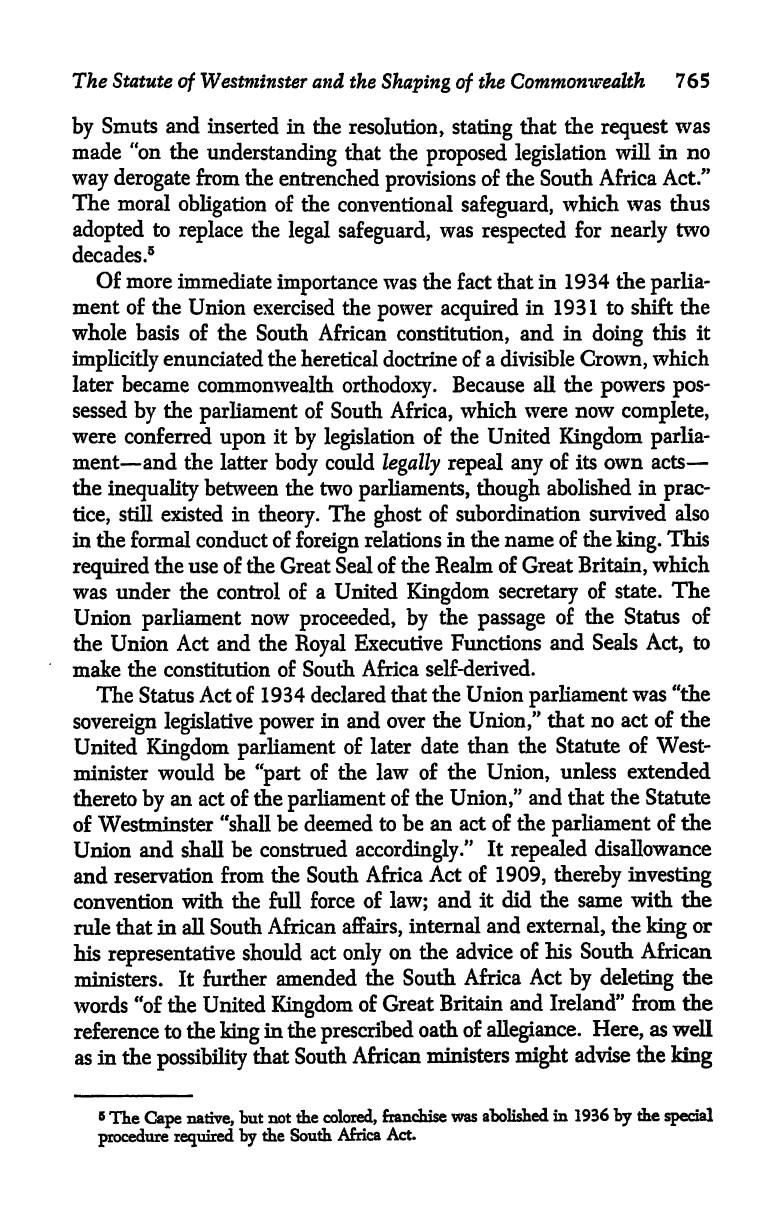
The Statute
of
Westminster and
the
Shaping
of
the
Commonwealth
765
by
Smuts
and
inserted
in
the
resolution,
stating
that
the
request
was
made "on the
understanding
that the
proposed
legislation
will
in
no
way
derogate
from
the
entrenched
provisions
of the South
Africa
Act/'
The
moral
obligation
of the
conventional
safeguard,
which
was
thus
adopted
to
replace
the
legal
safeguard,
was
respected
for
nearly
two
decades.
5
Of
more
immediate
importance
was
the
fact that
in 1934
the
parlia-
ment of the
Union
exercised the
power
acquired
in
1931 to
shift
the
whole
basis of the
South
African
constitution,
and
in
doing
this it
implicitly
enunciated
the
heretical
doctrine
of
a
divisible
Grown,
which
later
became
commonwealth
orthodoxy.
Because all
the
powers pos-
sessed
by
the
parliament
of
South
Africa,
which
were
now
complete,
were
conferred
upon
it
by
legislation
of the
United
Kingdom
parlia-
ment and
the latter
body
could
legally
repeal any
of its
own acts
the
inequality
between
the
two
parliaments, though
abolished
in
prac-
tice,
still existed in
theory.
The
ghost
of subordination
survived also
in the formal conduct of
foreign
relations in the
name
of
the
king.
This
required
the use
of
the
Great
Seal
of
the
Realm
of
Great
Britain,
which
was
under
the
control of
a
United
Kingdom
secretary
of
state.
The
Union
parliament
now
proceeded,
by
the
passage
of
the
Status
of
the
Union
Act
and
the
Royal
Executive
Functions
and
Seals
Act,
to
make
the constitution of South
Africa
self-derived.
The
Status Act
of 1934 declared
that
the Union
parliament
was
"the
sovereign
legislative power
in
and
over the
Union,"
that
no
act
of
the
United
Kingdom
parliament
of later
date
than
the Statute
of
West-
minister would be
"part
of
the
law
of
the
Union,
unless
extended
thereto
by
an act of the
parliament
of
the
Union,"
and
that
the
Statute
of Westminster
"shall be
deemed
to be
an act of
the
parliament
of
the
Union
and shall
be construed
accordingly."
It
repealed
disallowance
and
reservation
from
the
South
Africa Act
of
1909,
thereby investing
convention
with
the
full
force
of
law;
and
it did the same
with
the
rule
that
in
all
South
African
affairs,
internal and
external,
the
king
or
his
representative
should act
only
on
the
advice of his
South
African
ministers.
It
further
amended
the
South
Africa
Act
by
deleting
the
words
"of
the United
Kingdom
of
Great
Britain
and
Ireland"
from the
reference
to
the
king
in the
prescribed
oath
of
allegiance.
Here,
as
well
as in
the
possibility
that
South
African
ministers
might
advise the
king
5
The
Gape
native,
but
not the
colored,
franchise
was
abolished
in 1936
by
the
special
procedure required
by
the South
Africa
Act.
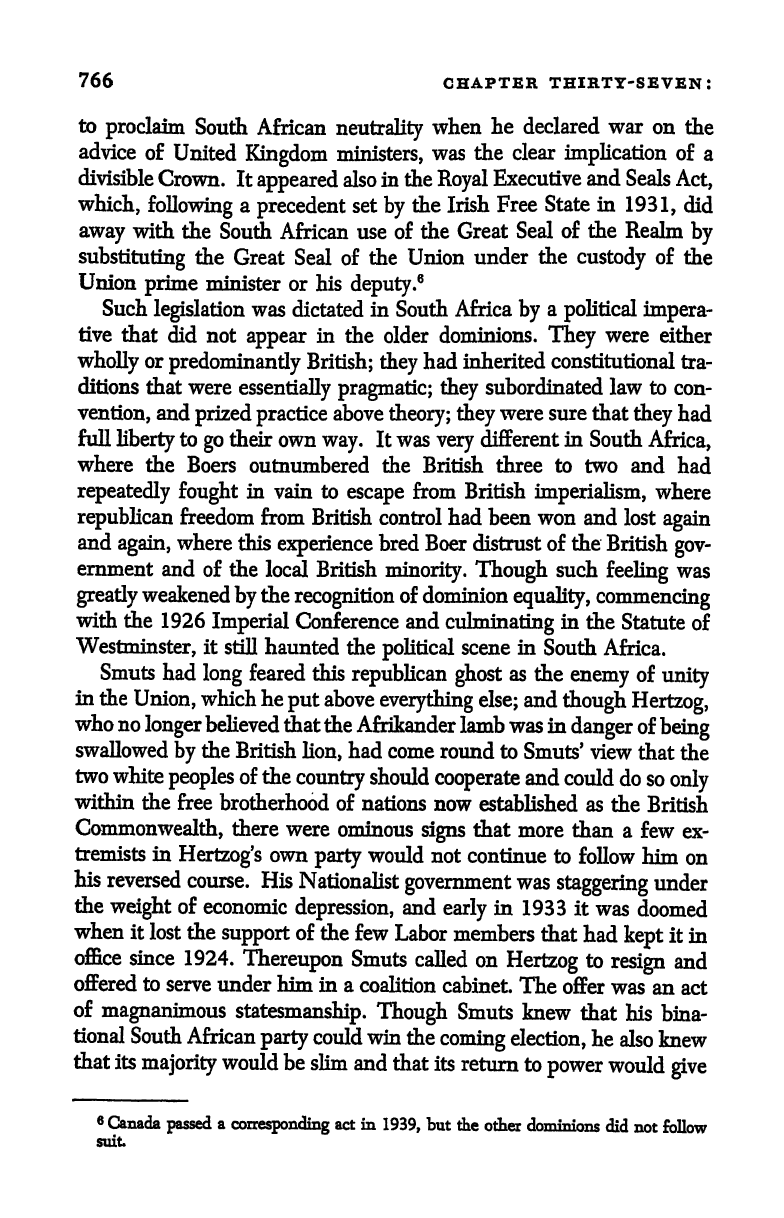
766
CHAPTER
THIRTY-SEVEN:
to
proclaim
South
African
neutrality
when
he
declared
war
on
the
advice
of
United
Kingdom
ministers,
was
the clear
implication
of
a
divisible
Crown.
It
appeared
also
in
the
Royal
Executive and
Seals
Act,
which,
following
a
precedent
set
by
the
Irish
Free
State in
1931,
did
away
with
the
South
African
use of
the Great
Seal
of
the
Realm
by
substituting
the
Great Seal
of
the Union
under
the
custody
of
the
Union
prime
minister or
his
deputy.
6
Such
legislation
was dictated
in
South
Africa
by
a
political
impera-
tive
that
did
not
appear
in the
older dominions.
They
were
either
wholly
or
predominantly
British;
they
had
inherited constitutional
tra-
ditions
that were
essentially
pragmatic;
they
subordinated law to
con-
vention,
and
prized
practice
above
theory;
they
were sure
that
they
had
full
liberty
to
go
their
own
way.
It
was
very
different
in
South
Africa,
where
the
Boers
outnumbered
the
British
three to
two and
had
repeatedly
fought
in vain
to
escape
from
British
imperialism,
where
republican
freedom from
British
control
had been won and
lost
again
and
again,
where
this
experience
bred Boer distrust
of
the
British
gov-
ernment
and
of the
local
British
minority.
Though
such
feeling
was
greatly
weakened
by
the
recognition
of dominion
equality,
commencing
with
the
1926
Imperial
Conference
and
culminating
in
the
Statute
of
Westminster,
it
still haunted
the
political
scene
in
South
Africa.
Smuts
had
long
feared
this
republican
ghost
as the
enemy
of
unity
in
the
Union,
which he
put
above
everything
else;
and
though
Hertzog,
who
no
longer
believed that
the Afrikander
lamb
was in
danger
of
being
swallowed
by
the British
lion,
had
come
round
to Smuts'
view
that
the
two
white
peoples
of the
country
should
cooperate
and
could
do
so
only
within
the free
brotherhood of
nations
now
established
as
the
British
Commonwealth,
there
were
ominous
signs
that
more
than
a
few
ex-
tremists
in
Hertzog's
own
party
would not
continue
to
follow
him
on
his
reversed
course.
His
Nationalist
government
was
staggering
under
the
weight
of
economic
depression,
and
early
in
1933
it
was
doomed
when
it lost the
support
of
the
few
Labor
members
that
had
kept
it
in
office since 1924.
Thereupon
Smuts
called on
Hertzog
to
resign
and
offered
to
serve
under
him
in a
coalition
cabinet.
The
offer
was
an
act
of
magnanimous
statesmanship.
Though
Smuts
knew
that
his
bina-
tional
South
African
party
could
win
the
coming
election,
he
also
knew
that
its
majority
would be slim
and
that
its
return
to
power
would
give
6
Canada
passed
a
corresponding
act
in
1939,
but
the
other
dominions
did
not
follow
suit
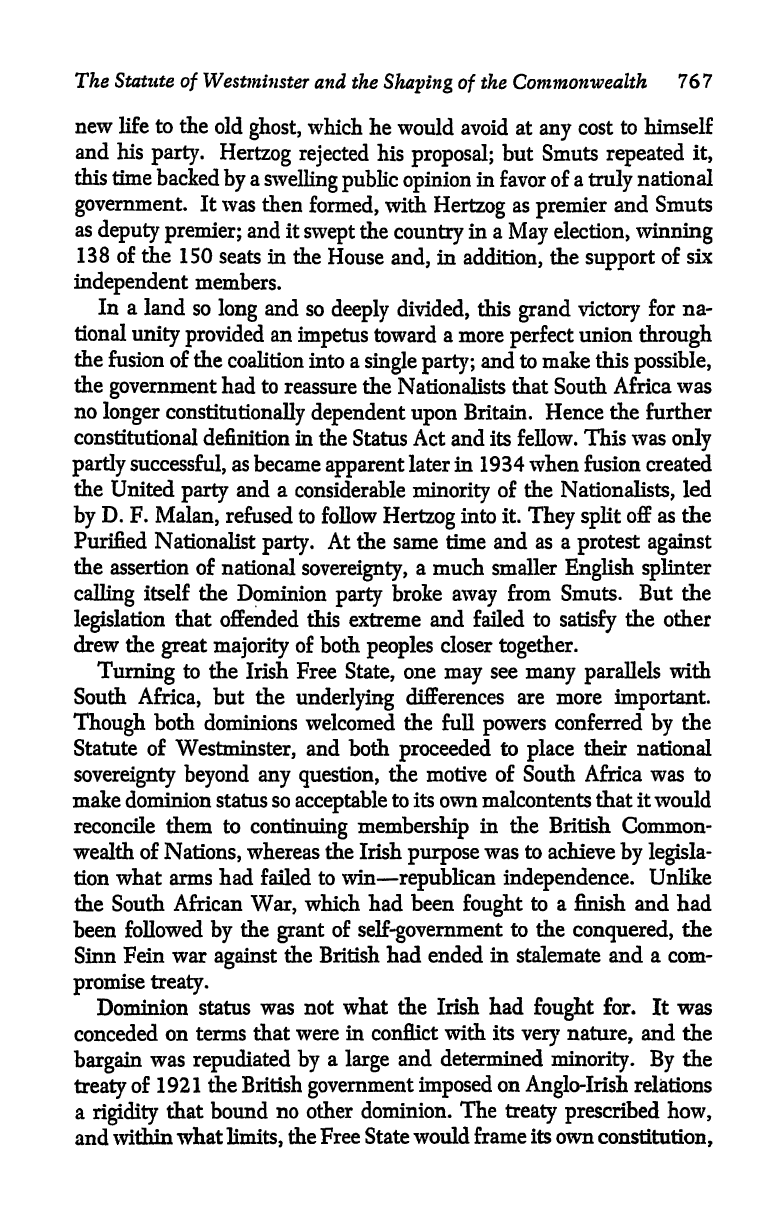
The
Statute
of
Westminster and
the
Shaping
of
the Commonwealth
767
new life to the
old
ghost,
which he
would avoid at
any
cost
to
himself
and his
party.
Hertzog
rejected
his
proposal;
but
Smuts
repeated
it,
this
time
backed
by
a
swelling
public
opinion
in
favor
of
a
truly
national
government.
It
was
then
formed,
with
Hertzog
as
premier
and
Smuts
as
deputy
premier;
and
it
swept
the
country
in a
May
election,
winning
138
of the
150
seats
in the
House
and,
in
addition,
the
support
of
six
independent
members.
In
a
land
so
long
and so
deeply
divided,
this
grand
victory
for
na-
tional
unity
provided
an
impetus
toward
a more
perfect
union
through
the
fusion
of the coalition
into
a
single party;
and
to make
this
possible,
the
government
had
to
reassure the
Nationalists
that
South
Africa was
no
longer
constitutionally
dependent upon
Britain. Hence
the further
constitutional
definition
in
the
Status Act and its fellow.
This
was
only
partly
successful,
as became
apparent
later
in 1934
when
fusion
created
the
United
party
and a
considerable
minority
of the
Nationalists,
led
by
D.
F.
Malan,
refused
to follow
Hertzog
into it.
They
split
off as the
Purified
Nationalist
party.
At
the
same
time
and
as a
protest
against
the
assertion
of
national
sovereignty,
a much smaller
English splinter
calling
itself the
Dominion
party
broke
away
from
Smuts.
But
the
legislation
that
offended this
extreme
and
failed to
satisfy
the other
drew the
great
majority
of
both
peoples
closer
together.
Turning
to the
Irish Free
State,
one
may
see
many
parallels
with
South
Africa,
but
the
underlying
differences
are more
important.
Though
both
dominions welcomed the full
powers
conferred
by
the
Statute of
Westminster,
and
both
proceeded
to
place
their
national
sovereignty
beyond
any question,
the motive of
South
Africa was to
make dominion status so
acceptable
to
its
own
malcontents that
it
would
reconcile
them
to
continuing
membership
in
the
British
Common-
wealth
of
Nations,
whereas
the
Irish
purpose
was
to achieve
by
legisla-
tion
what arms had
failed
to
win
republican independence.
Unlike
the
South
African
War,
which
had
been
fought
to
a
finish and had
been followed
by
the
grant
of
self-government
to the
conquered,
the
Sinn
Fein
war
against
the British had ended
in
stalemate and a
com-
promise
treaty.
Dominion
status
was
not what the
Irish
had
fought
for.
It
was
conceded
on terms
that
were in conflict
with its
very
nature,
and
the
bargain
was
repudiated
by
a
large
and determined
minority.
By
the
treaty
of
1921
the British
government
imposed
on
Anglo-Irish
relations
a
rigidity
that
bound
no other dominion.
The
treaty prescribed
how,
and
within
what
limits,
the
Free State would frame
its
own
constitution,
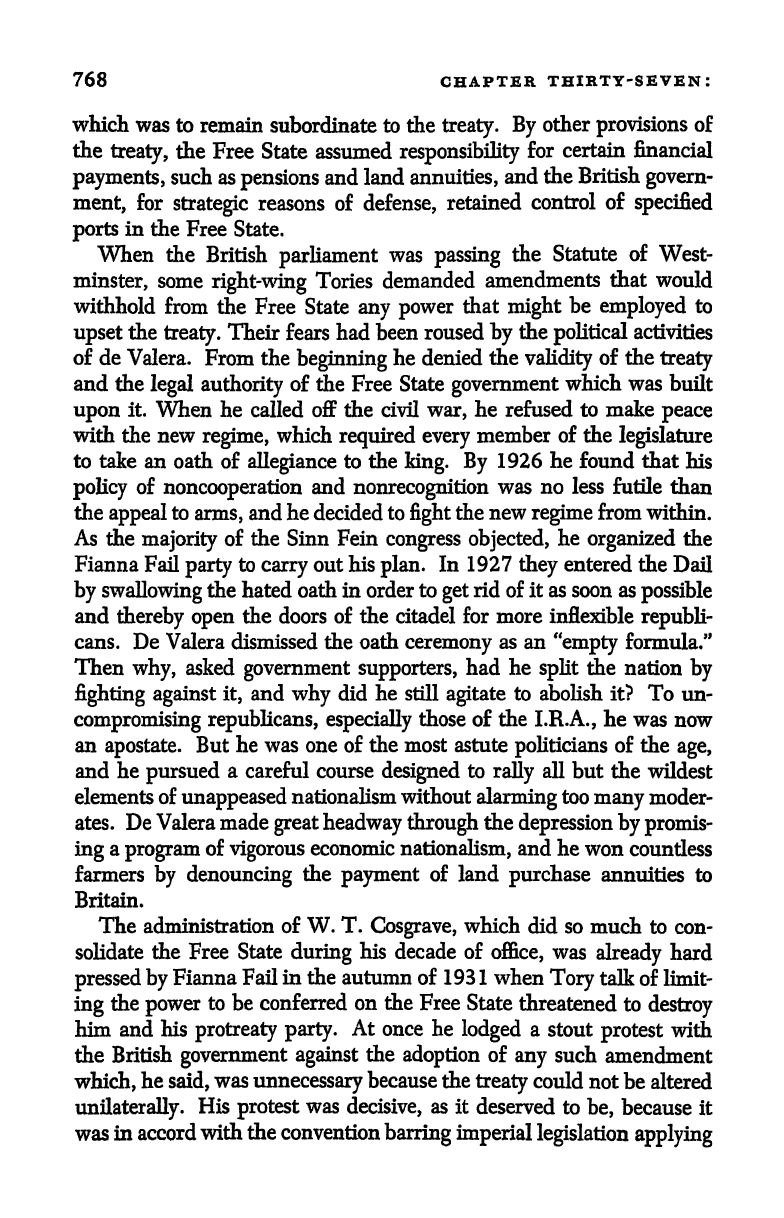
768
CHAPTER
THIRTY-SEVEN:
which was
to remain
subordinate to the
treaty.
By
other
provisions
of
the
treaty,
the Free
State assumed
responsibility
for
certain
financial
payments,
such as
pensions
and
land
annuities,
and
the
British
govern-
ment,
for
strategic
reasons
of
defense,
retained
control of
specified
ports
in
the Free
State.
When the
British
parliament
was
passing
the
Statute
of
West-
minster,
some
right-wing
Tories
demanded
amendments
that
would
withhold
from the Free State
any
power
that
might
be
employed
to
upset
the
treaty.
Their
fears had
been
roused
by
the
political
activities
of
de Valera.
From
the
beginning
he denied
the
validity
of
the
treaty
and
the
legal authority
of the
Free
State
government
which was
built
upon
it.
When
he called
off the civil
war,
he refused to
make
peace
with
the
new
regime,
which
required every
member
of the
legislature
to
take
an oath of
allegiance
to
the
king. By
1926
he
found
that
his
policy
of
noncooperation
and
nonrecognition
was no
less futile
than
the
appeal
to
arms,
and he
decided to
fight
the
new
regime
from
within.
As the
majority
of
the Sinn Fein
congress
objected,
he
organized
the
Fianna Fail
party
to
carry
out his
plan.
In
1927
they
entered the
Dail
by
swallowing
the hated oath
in
order to
get
rid of
it as
soon as
possible
and
thereby
open
the doors
of the
citadel
for more
inflexible
republi-
cans.
De Valera
dismissed the
oath
ceremony
as
an
"empty
formula."
Then
why,
asked
government
supporters,
had he
split
die
nation
by
fighting against
it,
and
why
did
he
still
agitate
to abolish
it?
To
un-
compromising
republicans, especially
those
of
the
I.R.A.,
he
was
now
an
apostate.
But
he was one
of
the most astute
politicians
of
the
age,
and he
pursued
a
careful course
designed
to
rally
all
but the
wildest
elements
of
unappeased
nationalism
without
alarming
too
many
moder-
ates. De
Valera made
great
headway
through
the
depression
by promis-
ing
a
program
of
vigorous
economic
nationalism,
and he
won
countless
farmers
by
denouncing
the
payment
of
land
purchase
annuities to
Britain.
The
administration
of
W. T.
Cosgrave,
which
did
so
much to
con-
solidate
the Free
State
during
his decade
of
office,
was
already
hard
pressed
by
Fianna
Fail
in the autumn
of
193
1
when
Tory
talk
of limit-
ing
the
power
to be
conferred on
the
Free
State
threatened to
destroy
him
and his
protreaty
party.
At
once he
lodged
a
stout
protest
with
the
British
government
against
the
adoption
of
any
such
amendment
which,
he
said,
was
unnecessary
because
the
treaty
could
not be
altered
unilaterally.
His
protest
was
decisive,
as it
deserved
to
be,
because it
was in accord
with
the
convention
barring
imperial
legislation
applying
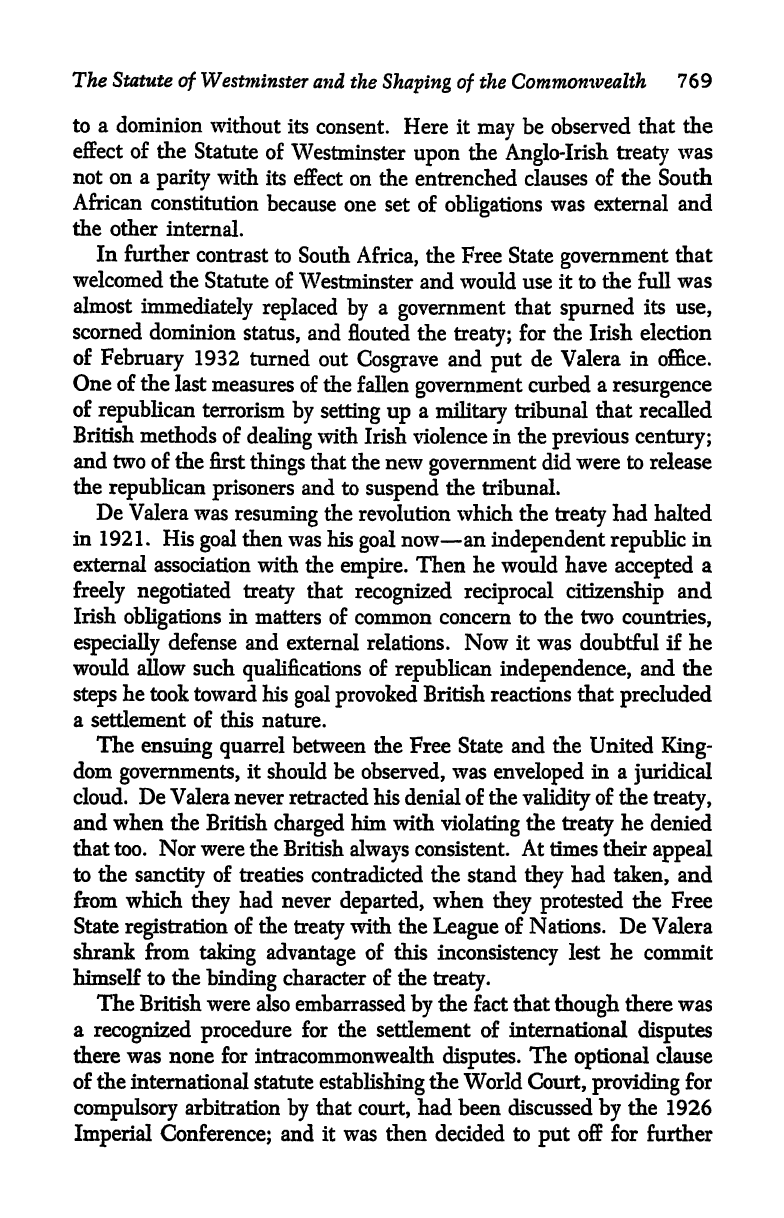
The
Statute
of
Westminster
and
the
Shaping
of
the Commonwealth
769
to
a
dominion
without
its
consent. Here it
may
be observed
that
the
effect
of the
Statute
of
Westminster
upon
the
Anglo-Irish
treaty
was
not
on
a
parity
with
its
effect on
the entrenched clauses
of the South
African
constitution
because one
set
of
obligations
was
external
and
the
other
internal.
In
further
contrast
to South
Africa,
the
Free
State
government
that
welcomed
the
Statute of
Westminster
and would
use it to
the full
was
almost
immediately
replaced
by
a
government
that
spurned
its
use,
scorned
dominion
status,
and
flouted
the
treaty;
for
the Irish
election
of
February
1932
turned
out
Cosgrave
and
put
de Valera
in
office.
One
of the
last
measures of the
fallen
government
curbed
a
resurgence
of
republican
terrorism
by
setting
up
a
military
tribunal
that recalled
British
methods
of
dealing
with Irish violence in the
previous century;
and two of
the
first
things
that the
new
government
did
were
to release
the
republican
prisoners
and to
suspend
the
tribunal.
De
Valera
was
resuming
the
revolution which the
treaty
had halted
in 1921.
His
goal
then
was his
goal
now an
independent republic
in
external
association
with
the
empire.
Then he would
have
accepted
a
freely
negotiated treaty
that
recognized
reciprocal
citizenship
and
Irish
obligations
in
matters of common concern to
the two
countries,
especially
defense
and
external relations.
Now it
was
doubtful if
he
would
allow such
qualifications
of
republican independence,
and the
steps
he
took
toward
his
goal
provoked
British
reactions that
precluded
a
settlement
of
this
nature.
The
ensuing
quarrel
between
the
Free
State
and the United
King-
dom
governments,
it
should be
observed,
was
enveloped
in
a
juridical
cloud.
De
Valera never
retracted his denial
of
the
validity
of
the
treaty,
and when the
British
charged
him
with
violating
the
treaty
he
denied
that too. Nor were
the British
always
consistent.
At
times their
appeal
to the
sanctity
of treaties
contradicted the stand
they
had
taken,
and
from
which
they
had
never
departed,
when
they
protested
the
Free
State
registration
of
the
treaty
with
the
League
of Nations.
De
Valera
shrank
from
taking
advantage
of this
inconsistency
lest
he
commit
himself
to the
binding
character of the
treaty.
The British were
also
embarrassed
by
the fact that
though
there was
a
recognized
procedure
for
the
settlement
of international
disputes
there was
none
for
intracommonwealth
disputes.
The
optional
clause
of the
international
statute
establishing
the
World
Court,
providing
for
compulsory
arbitration
by
that
court,
had
been discussed
by
the
1926
Imperial
Conference;
and it
was
then
decided
to
put
off
for further
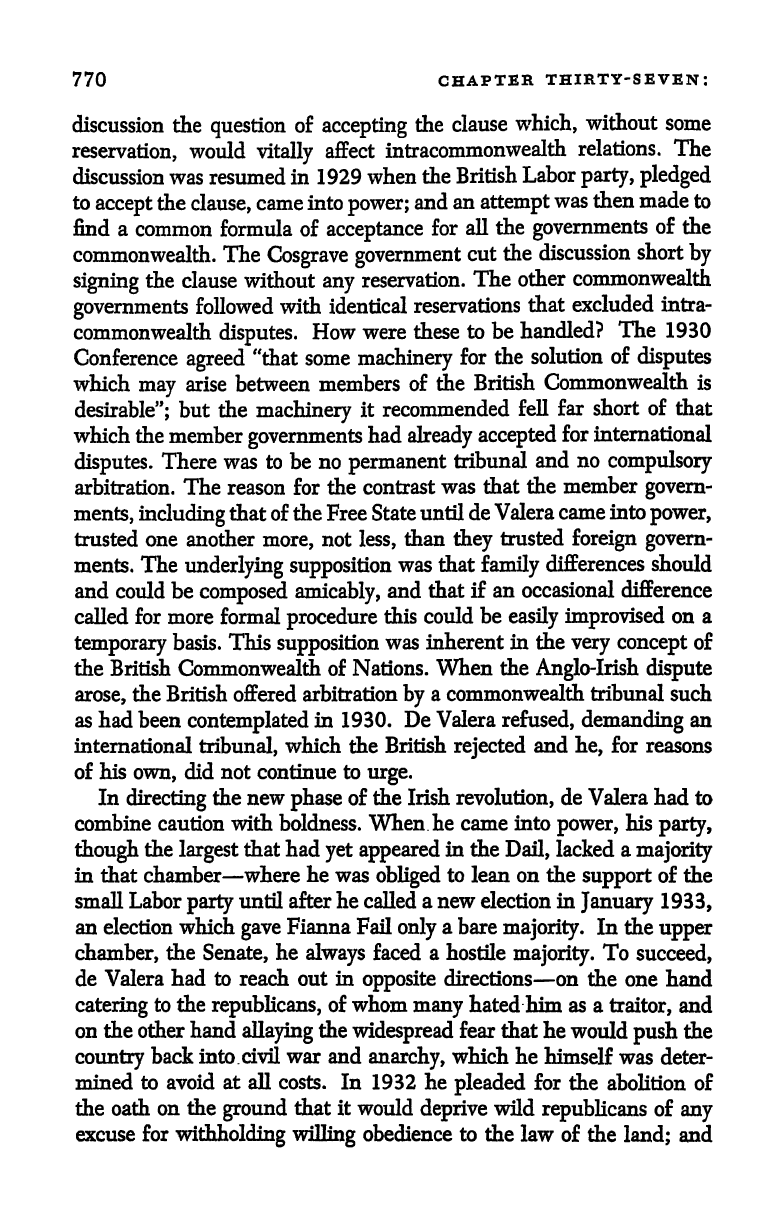
770 CHAPTER
THIRTY-SEVEN:
discussion the
question
of
accepting
the clause
which,
without
some
reservation,
would
vitally
affect
intracommonwealth
relations.
The
discussion was resumed
in 1929
when
the
British
Labor
party,
pledged
to
accept
the
clause,
came
into
power;
and
an
attempt
was then made
to
find a
common formula of
acceptance
for
all
the
governments
of
the
commonwealth. The
Cosgrave
government
cut
the
discussion
short
by
signing
the clause without
any
reservation.
The
other
commonwealth
governments
followed
with identical
reservations
that
excluded
intra-
commonwealth
disputes.
How
were
these to be
handled?
The
1930
Conference
agreed
"that some
machinery
for
the
solution
of
disputes
which
may
arise between
members
of
the
British
Commonwealth
is
desirable";
but
the
machinery
it
recommended
fell
far short
of
that
which
the
member
governments
had
already
accepted
for
international
disputes.
There was to be no
permanent
tribunal
and
no
compulsory
arbitration. The reason for
the contrast
was that
the
member
govern-
ments,
including
that
of
the Free
State
until
de
Valera
came into
power,
trusted one another
more,
not
less,
than
they
trusted
foreign
govern-
ments. The
underlying
supposition
was that
family
differences should
and
could
be
composed
amicably,
and
that
if an occasional difference
called for more formal
procedure
this could
be
easily
improvised
on a
temporary
basis. This
supposition
was
inherent in the
very concept
of
the British
Commonwealth
of Nations.
When the
Anglo-Irish
dispute
arose,
the British offered arbitration
by
a commonwealth tribunal such
as
had
been
contemplated
in 1930.
De Valera
refused,
demanding
an
international
tribunal,
which
the
British
rejected
and
he,
for
reasons
of his
own,
did not
continue
to
urge.
In
directing
the new
phase
of the
Irish
revolution,
de Valera had to
combine caution
with
boldness.
When he
came into
power,
his
party,
though
the
largest
that had
yet
appeared
in the
Dail,
lacked
a
majority
in that chamber
where he was
obliged
to lean on the
support
of
the
small Labor
party
until
after he
called
a new election in
January
1933,
an election which
gave
Fianna Fail
only
a bare
majority.
In the
upper
chamber,
the
Senate,
he
always
faced a hostile
majority.
To
succeed,
de
Valera
had to reach out in
opposite
directions on
the one
hand
catering
to the
republicans,
of whom
many
hated him as
a
traitor,
and
on
the other hand
allaying
the
widespread
fear that
he
would
push
the
country
back into civil
war
and
anarchy,
which
he
himself was deter-
mined to
avoid
at all costs. In
1932
he
pleaded
for the
abolition of
the
oath
on
the
ground
that it would
deprive
wild
republicans
of
any
excuse
for
withholding willing
obedience to the
law of
the
land;
and
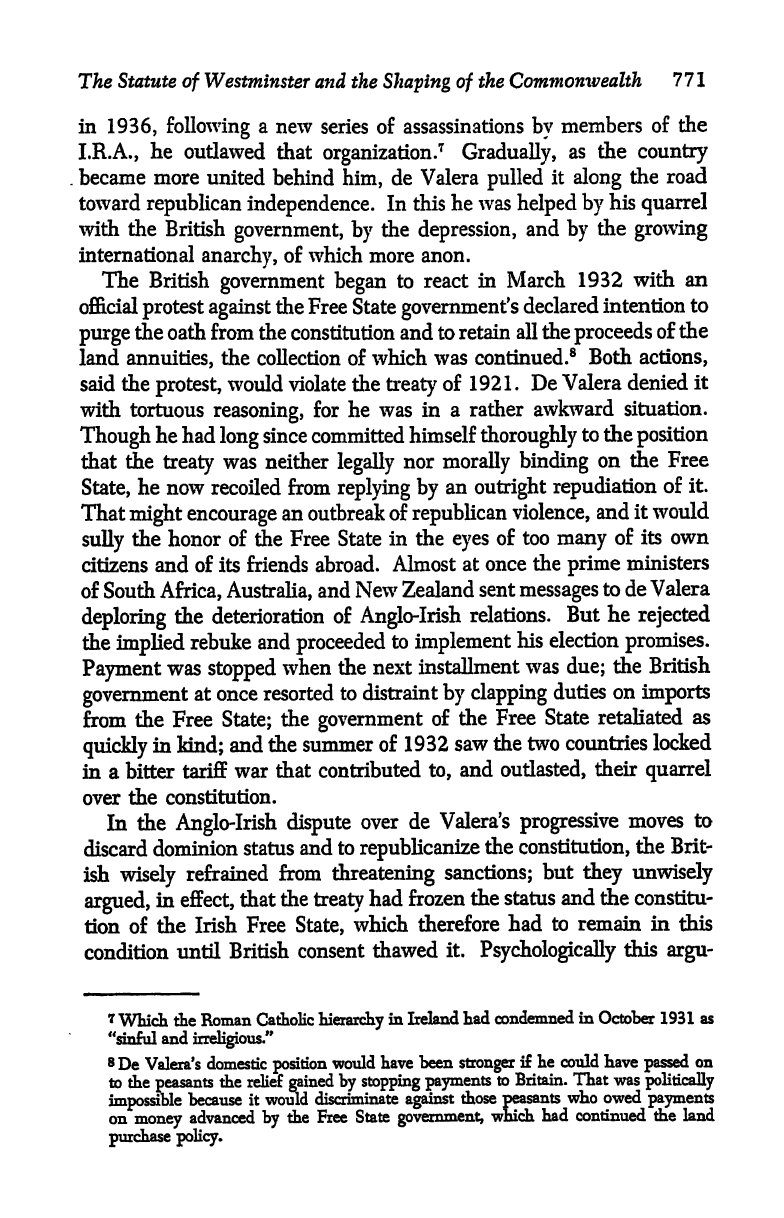
The
Statute
of
Westminster and the
Shaping
of
the
Commonwealth
771
in
1936,
following
a
new
series of assassinations
by
members
of
the
I.R.A.,
he
outlawed that
organization.
7
Gradually,
as
the
country
. became
more
united
behind
him,
de
Valera
pulled
it
along
the
road
toward
republican
independence.
In
this
he
was
helped
by
his
quarrel
with
the
British
government, by
the
depression,
and
by
the
growing
international
anarchy,
of which more
anon.
The
British
government
began
to
react in
March
1932
with
an
official
protest against
the
Free
State
government's
declared
intention
to
purge
the
oath from the
constitution
and to
retain
all
the
proceeds
of
the
land
annuities,
the
collection of which
was continued.
8
Both
actions,
said
the
protest,
would violate the
treaty
of
1921. De
Valera denied
it
with
tortuous
reasoning,
for
he was in
a
rather
awkward
situation.
Though
he
had
long
since committed
himself
thoroughly
to the
position
that
the
treaty
was neither
legally
nor
morally
binding
on
the
Free
State,
he
now
recoiled
from
replying
by
an
outright
repudiation
of
it.
That
might encourage
an outbreak
of
republican
violence,
and
it
would
sully
the honor of the Free
State
in the
eyes
of
too
many
of
its own
citizens and
of
its friends abroad.
Almost
at once
the
prime
ministers
of South
Africa,
Australia,
and
New
Zealand
sent
messages
to de Valera
deploring
the deterioration
of
Anglo-Irish
relations.
But
he
rejected
the
implied
rebuke and
proceeded
to
implement
his
election
promises.
Payment
was
stopped
when
the
next
installment
was
due;
the
British
government
at
once
resorted
to
distraint
by
clapping
duties
on
imports
from
the
Free
State;
the
government
of
the
Free
State retaliated as
quickly
in
kind;
and
the
summer of
1932
saw
the
two
countries locked
in
a bitter
tariff
war
that contributed
to,
and
outlasted,
their
quarrel
over
the constitution.
In
the
Anglo-Irish
dispute
over
de
Valera's
progressive
moves
to
discard
dominion
status
and
to
republicanize
the
constitution,
the Brit-
ish
wisely
refrained
from
threatening
sanctions;
but
they unwisely
argued,
in
effect,
that
the
treaty
had
frozen
the
status and
the constitu-
tion
of
the
Irish
Free
State,
which
therefore
had
to remain in
this
condition
until
British consent
thawed
it.
Psychologically
this
argu-
7
Which
the
Roman Catholic
hierarchy
in Ireland
had
condemned
in
October 1931
as
"sinful
and
irreligious."
8
De Valera's
domestic
position
would
have
been
stronger
if
he could have
passed
on
to
the
peasants
the relief
gained
by stopping
payments
to
Britain.
That
was
politically
impossible
because
it
would
discriminate
against
those
peasants
who owed
payments
on
money
advanced
by
the
Free State
government,
which
had continued the
land
purchase
policy.
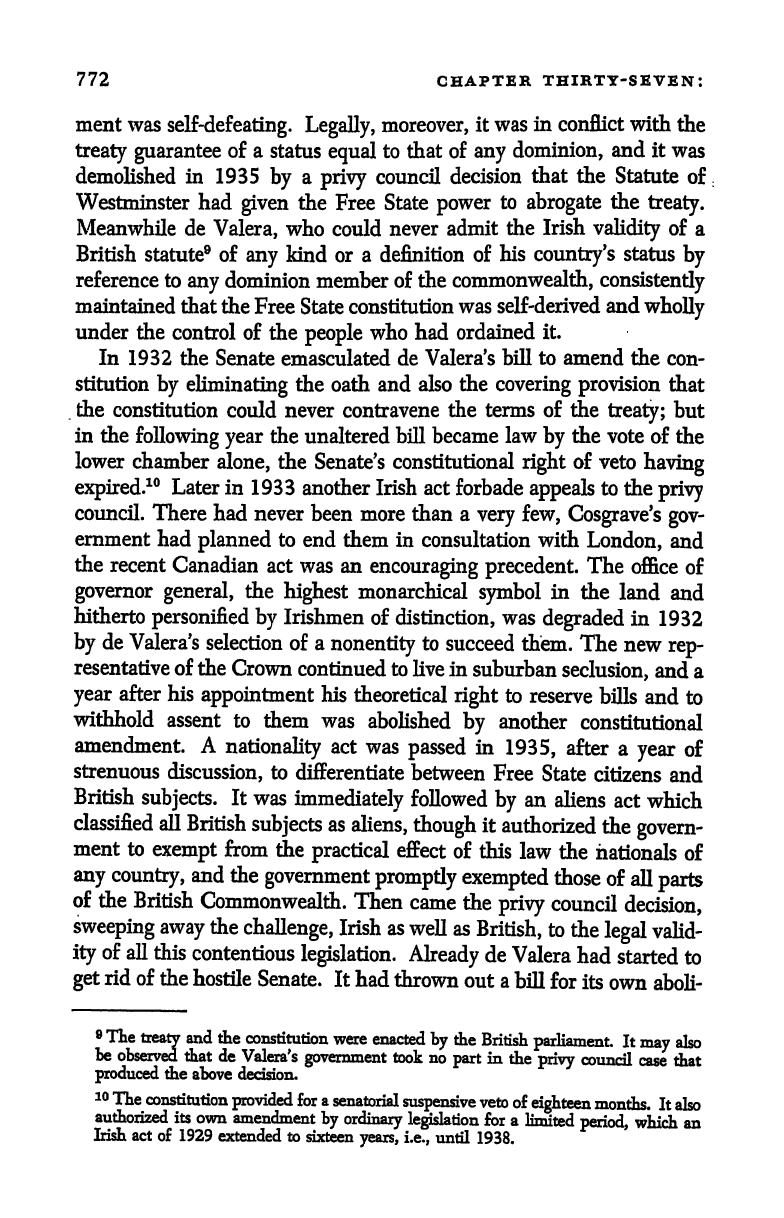
772
CHAPTER
THIRTY-SEVEN:
ment was
self-defeating.
Legally,
moreover,
it
was
in
conflict
with
the
treaty
guarantee
of
a
status
equal
to that of
any
dominion,
and
it
was
demolished
in 1935
by
a
privy
council decision
that
the
Statute
of
.
Westminster had
given
the Free
State
power
to
abrogate
the
treaty.
Meanwhile
de
Valera,
who
could
never
admit
the
Irish
validity
of
a
British
statute
9
of
any
kind or
a definition
of
his
country's
status
by
reference
to
any
dominion member of
the
commonwealth,
consistently
maintained that
the Free
State
constitution
was
self-derived
and
wholly
under the
control of
the
people
who had
ordained
it.
In 1932
the
Senate
emasculated
de
Valera's
bill to
amend the
con-
stitution
by
eliminating
the oath
and
also
the
covering provision
that
.
the
constitution
could
never
contravene
the
terms of
the
treaty;
but
in the
following
year
the unaltered
bill became
law
by
the vote
of
the
lower
chamber
alone,
the Senate's constitutional
right
of
veto
having
expired.
10
Later
in
1933 another
Irish act forbade
appeals
to
the
privy
council.
There
had never
been more
than
a
very
few,
Cosgrave's
gov-
ernment
had
planned
to
end them in
consultation
with
London,
and
the
recent
Canadian
act
was
an
encouraging
precedent.
The
office
of
governor
general,
the
highest
monarchical
symbol
in
the
land
and
hitherto
personified
by
Irishmen
of
distinction,
was
degraded
in
1932
by
de
Valera's
selection
of
a
nonentity
to
succeed them.
The
new
rep-
resentative of
the
Crown
continued
to
live
in
suburban
seclusion,
and a
year
after his
appointment
his
theoretical
right
to
reserve
bills
and
to
withhold assent
to
them
was
abolished
by
another
constitutional
amendment. A
nationality
act was
passed
in
1935,
after
a
year
of
strenuous
discussion,
to
differentiate
between
Free
State
citizens
and
British
subjects.
It
was
immediately
followed
by
an
aliens
act
which
classified
all
British
subjects
as
aliens,
though
it
authorized
the
govern-
ment
to
exempt
from
the
practical
effect
of
this
law
the
nationals of
any
country,
and
the
government
promptly
exempted
those
of
all
parts
of
the
British
Commonwealth.
Then
came
the
privy
council
decision,
sweeping
away
the
challenge,
Irish
as
well
as
British,
to
the
legal
valid-
ity
of
all
this
contentious
legislation.
Already
de
Valera
had
started
to
get
rid of
the
hostile
Senate.
It had
thrown
out a
bill
for
its
own
aboli-
8
The
treaty
and
the
constitution
were
enacted
by
the
British
parliament.
It
may
also
he
observed
that
de Valera's
government
took
no
part
in
the
privy
council
case
that
produced
the
above
decision.
10
The
constitution
provided
for
a
senatorial
suspensive
veto
of
eighteen
months.
It
also
authorized
its own
amendment
by
ordinary
legislation
for a
limited
period,
which an
Irish act
of
1929
extended
to
sixteen
years,
i.e.,
until
1938.
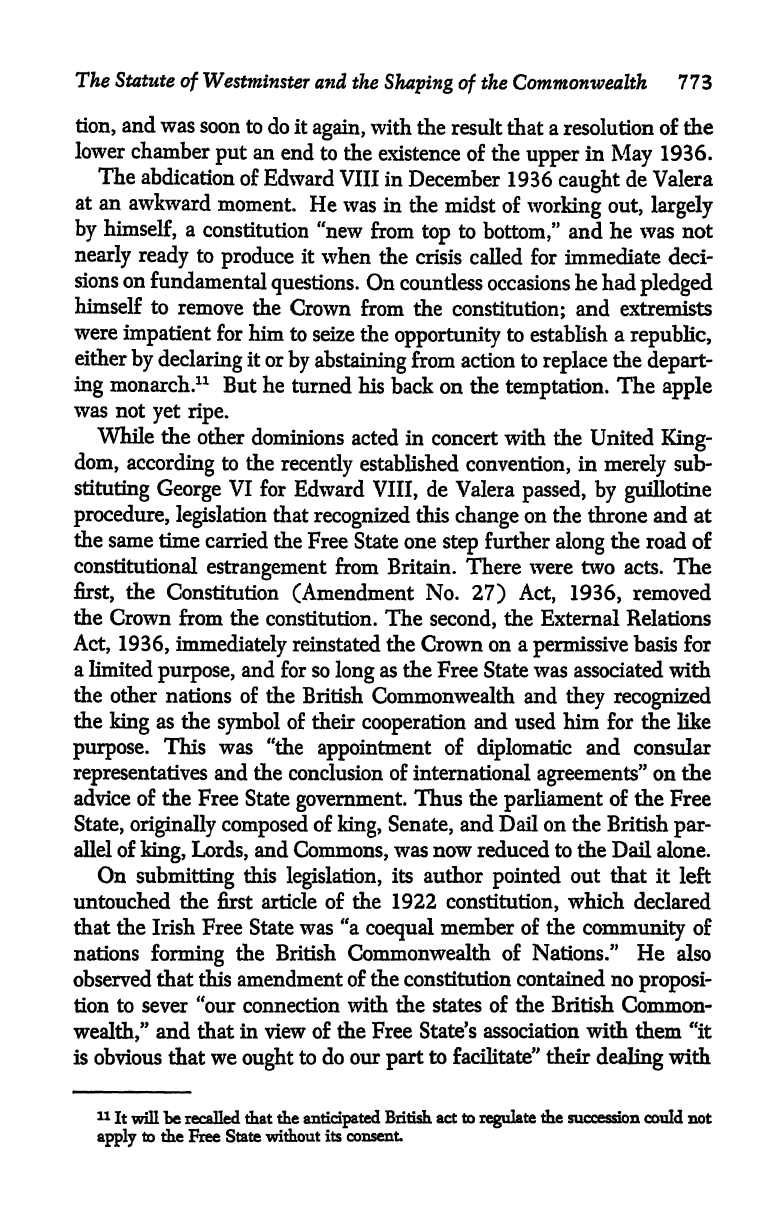
The
Statute
of
Westminster
and
the
Shaping of
the
Commonwealth 773
tion,
and
was
soon
to
do it
again,
with the result
that
a resolution of the
lower
chamber
put
an
end
to
the
existence of the
upper
in
May
1936.
The
abdication
of
Edward
VIII
in
December
1936
caught
de Valera
at
an
awkward
moment.
He
was in
the
midst of
working
out,
largely
by
himself,
a
constitution
"new
from
top
to
bottom,"
and
he was not
nearly
ready
to
produce
it
when the
crisis
called
for
immediate
deci-
sions on
fundamental
questions.
On countless occasions he had
pledged
himself
to
remove
the
Crown
from the
constitution;
and
extremists
were
impatient
for
him
to
seize the
opportunity
to establish
a
republic,
either
by
declaring
it or
by
abstaining
from action to
replace
the
depart-
ing
monarch.
11
But
he
turned his
back
on
the
temptation.
The
apple
was
not
yet
ripe.
While
the
other
dominions
acted
in concert with the United
King-
dom,
according
to the
recently
established
convention,
in
merely
sub-
stituting
George
VI for
Edward
VIII,
de Valera
passed, by guillotine
procedure,
legislation
that
recognized
this
change
on the throne
and at
the
same
time
carried the
Free State
one
step
further
along
the
road of
constitutional
estrangement
from
Britain.
There
were
two acts. The
first,
the
Constitution
(Amendment
No.
27)
Act, 1936,
removed
the
Crown from
the constitution.
The
second,
the
External
Relations
Act,
1936,
immediately
reinstated the Crown on
a
permissive
basis
for
a
limited
purpose,
and
for so
long
as
the Free
State was associated with
the
other
nations of
the British
Commonwealth and
they
recognized
the
king
as
the
symbol
of their
cooperation
and
used
him
for
the like
purpose.
This was "the
appointment
of
diplomatic
and
consular
representatives
and the conclusion of
international
agreements"
on
the
advice of the Free
State
government.
Thus the
parliament
of the
Free
State,
originally
composed
of
king,
Senate,
and
Dail on
the
British
par-
allel of
king,
Lords,
and
Commons,
was now reduced to
the Dail
alone.
On
submitting
this
legislation,
its author
pointed
out that
it
left
untouched the
first
article of the 1922
constitution,
which
declared
that the Irish Free State was "a
coequal
member
of
the
community
of
nations
forming
the
British
Commonwealth
of Nations."
He
also
observed
that this amendment of
the
constitution
contained
no
proposi-
tion
to
sever "our connection
with
the
states
of
the
British Common-
wealth/'
and
that
in view of the Free State's
association with
them "it
is obvious that we
ought
to
do our
part
to facilitate"
their
dealing
with
11
It
will
be
recalled that
the
anticipated
British
act to
regulate
the
succession could
not
apply
to
the
Free State
without its consent.
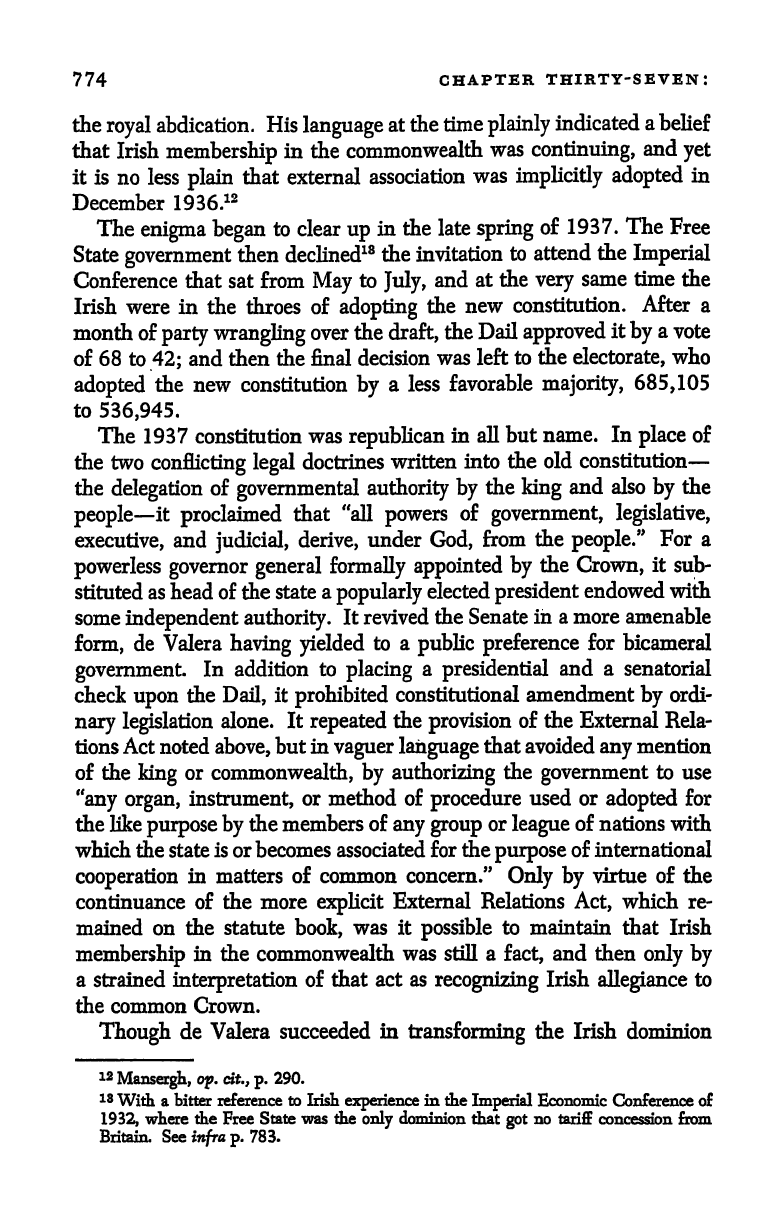
774
CHAPTER
THIRTY-SEVEN:
the
royal
abdication.
His
language
at the
time
plainly
indicated
a
belief
that
Irish
membership
in the
commonwealth
was
continuing,
and
yet
it is
no less
plain
that
external
association
was
implicitly
adopted
in
December
1936.
12
The
enigma
began
to clear
up
in
the late
spring
of
1937. The
Free
State
government
then
declined
18
the invitation
to
attend
the
Imperial
Conference that sat from
May
to
July,
and
at
the
very
same
time
the
Irish were in the
throes
of
adopting
the
new
constitution.
After
a
month of
party wrangling
over
the
draft,
the
Dail
approved
it
by
a
vote
of
68
to
42;
and
then the final
decision
was left
to
tie
electorate,
who
adopted
the new
constitution
by
a less
favorable
majority,
685,105
to
536,945.
The 1937
constitution
was
republican
in all
but
name. In
place
of
the
two
conflicting
legal
doctrines
written
into
the old
constitution
the
delegation
of
governmental
authority
by
the
king
and
also
by
the
people
it
proclaimed
that "all
powers
of
government,
legislative,
executive,
and
judicial,
derive,
under
God,
from
the
people."
For
a
powerless
governor
general
formally
appointed
by
the
Crown,
it
sub-
stituted as head of
the
state
a
popularly
elected
president
endowed
with
some
independent
authority.
It
revived
the Senate
in a more
amenable
form,
de Valera
having
yielded
to
a
public preference
for
bicameral
government.
In addition
to
placing
a
presidential
and
a
senatorial
check
upon
the
Dail,
it
prohibited
constitutional amendment
by
ordi-
nary
legislation
alone.
It
repeated
the
provision
of the External
Rela-
tions Act noted
above,
but
in
vaguer language
that avoided
any
mention
of
the
king
or
commonwealth,
by authorizing
the
government
to use
"any
organ,
instrument,
or method
of
procedure
used or
adopted
for
the like
purpose
by
the members
of
any
group
or
league
of
nations with
which
the state
is
or becomes
associated for
the
purpose
of
international
cooperation
in matters
of common concern."
Only by
virtue of the
continuance
of the more
explicit
External Relations
Act,
which
re-
mained on
the
statute
book,
was it
possible
to maintain that Irish
membership
in the commonwealth
was still
a
fact,
and then
only by
a
strained
interpretation
of
that act as
recognizing
Irish
allegiance
to
the common Crown.
Though
de Valera
succeeded
in
transforming
the Irish
dominion
12
Mansergh,
op.
eft.,
p.
290.
is
With a
bitter reference
to Irish
experience
in the
Imperial
Economic Conference
of
1932,
where the Free State
was
the
only
dominion that
got
no tariff
concession from
Britain.
See
infra
p.
783.
